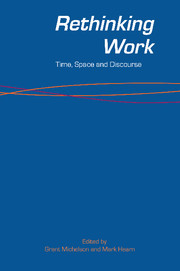Book contents
- Frontmatter
- Contents
- Tables and Figure
- Contributors
- Editorial Statement
- Abbreviations
- 1 Going to a New Place
- PART I TIME
- PART II SPACE
- 7 Union Power
- 8 Globalisation and Labour Mobility
- 9 A Spatial Perspective on International Work and Management
- 10 Markets and the Spatial Organisation of Work
- PART III DISCOURSE
- COMMENTARY
- Index
8 - Globalisation and Labour Mobility
Migrants Making Spaces, Migrants Changing Spaces
Published online by Cambridge University Press: 05 June 2012
- Frontmatter
- Contents
- Tables and Figure
- Contributors
- Editorial Statement
- Abbreviations
- 1 Going to a New Place
- PART I TIME
- PART II SPACE
- 7 Union Power
- 8 Globalisation and Labour Mobility
- 9 A Spatial Perspective on International Work and Management
- 10 Markets and the Spatial Organisation of Work
- PART III DISCOURSE
- COMMENTARY
- Index
Summary
Labour mobility is spatially defined both in the country of emigration and in the host or receiving country. That is, migration decisions are influenced by where people are already located in their own labour markets as well as where they think they will be located in the new country. A range of factors including cultural or human capital (or skill endowments) help shape the decision to allow migrants into a host country.
Labour geographers show how key stakeholders (in this case, skilled migrants entering Australia, employers, professional associations, the state and migrant coalitions) interact to shape the labour market spatial arrangements and the movement of potential labour market participants within and between different labour market spaces (Peck 1996). The pressures forged by the interaction between these players, over time, generate the dynamic and evolving labour market landscape. What is brought out in this analysis is how labour markets develop in tandem with social, political and material institutions and function in geographically specific ways, thus challenging the notion that labour markets are determined by universal economic principles alone (Peck 1996). To date, there has been little rigorous analysis of the insights offered by labour geographers on the labour market experience of migrants, be they skilled (Kofman et al. 2000; Ley 2004) or unskilled (Anthias & Lazaridis 2000), male or female (Anthias & Lazaridis 2000; Kofman et al. 2000), temporary or permanent (Khoo et al. 2003), invited by the host country (pull factors), or forced to leave by the country of emigration (push factors).
Information
- Type
- Chapter
- Information
- Rethinking WorkTime, Space and Discourse, pp. 144 - 164Publisher: Cambridge University PressPrint publication year: 2006
Accessibility standard: Unknown
- 2
- Cited by
